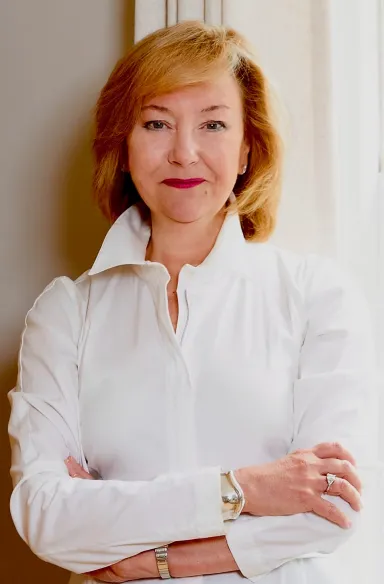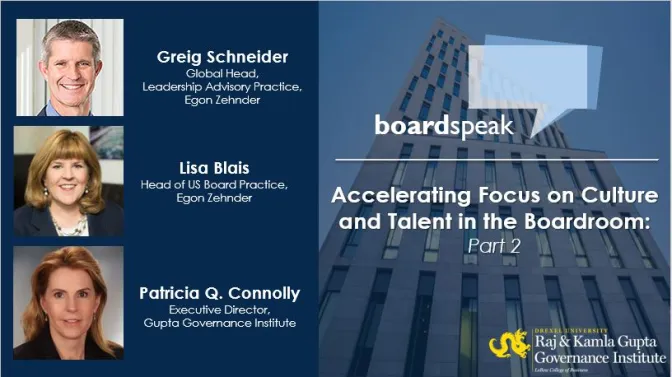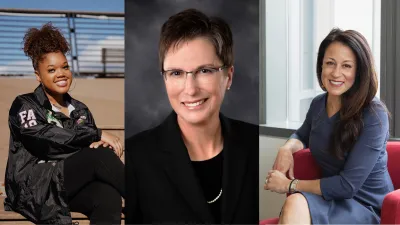
How to Plan a Career Transition to Board Director

In this month’s “In the Spotlight” interview Melissa Ludwig, Board Member of the Center for Corporate Governance, shares her experiences and advice transitioning from a corporate career to serving as a Board Director and as a Board Chair.
Q: Why was serving on a Board of Directors of interest to you?
Melissa: A few things immediately come to mind. First, in my background working at a Fortune 500 company I enjoyed decision making positions that directly impacted business outcomes. I wanted an opportunity where I could help other companies further their priorities and growth initiatives. Second, I found the space fascinating! I was very fortunate to have mentors who really invested time, gave me actionable advice including studying target companies including their 10-K which furthered my interest seeing much of this aligning with my career work. Finally, my involvement with non-profit board governance which included Philadelphia Convention and Visitors Bureau, Susan G. Komen, ALS, and co-founding the Fashion Incubator in Philadelphia all set the stage for my interest in helping others beyond what I was doing already in my current role at Macy’s. This work afforded me the education and comfort at a Board table to see where I could make a difference. The combination of all those factors led me onto the Board path.
Q: How did you educate yourself on the role requirements and expectations of being a director?
Melissa: After I stepped away from my career in the retail industry, I went on a discovery journey because I didn’t know what I didn’t know. I recognized that if I was going to move into the Board space, I needed to understand what was happening out there in other industries. I met with at least 20 leaders in the Philadelphia marketplace to get a better understanding of other business models. I picked several mentors that became part of a support group to help me establish where I can add value as a director. During this self-discovery, I realized the core of my passion and career was helping people internally and externally in my organization. Transitioning to Board work brought me full circle onto a path where I could help a lot of people and an organization. Four key foundational milestones set the stage for my board career today: Having authentic mentors, attending the Drexel Director’s Academy, expanding my network through targeted memberships, and being current with governance topics with National Association of Corporate Directors (NACD).
The support of mentors is valuable at every stage of your career. I have a business mentor and a personal mentor. As we discuss challenges or what I want to do, they provide real life feedback and perspective in my plans so I can be prepared and successful. My mentors, including Carol Johnson former President and COO of AlliedBarton Security Services, helped uncover and guide me in closing the gaps in my education and experience to be successful. Carol is well known in the Board space. She recommended Drexel’s Raj and Kamla Gupta Governance Institute’s Director’s Academy Certificate Program as a way to validate and evolve my skills from an involved executive into an overseeing board member. The two-day program provided an understanding of the increasingly complex and ever-changing role of a corporate board member prepared to contribute to discussions occurring in the boardroom. I received a Certificate in Director Education.
I built an unbelievable network throughout my career, but it was time to broaden my reach. I was introduced to several membership organizations which accelerated that goal. Seeing my passion to advance women’s careers, I joined the Forum of Executive Women becoming the Chair of Women in Leadership and a Board Director. My involvement with the NACD was the final step in building an ecosystem. It provides the ongoing education required when doing this job. Here I could learn about areas outside of my expertise. For example, I am not a CPA and didn’t know the granular language of auditors. However, I attended NACD programs with laser focus on these topics and was able to contribute to conversations. I also reached out to the Search community to gain visibility and build relationships. Sally Stetson of Salverson Stetson took an interest in my background and goal, which led me to serving on a Public Company Board that played to my strengths. I am incredibly grateful to all that have supported my journey.
Q: What’s the timespan that that all took?
Melissa: It took me about a year to find my footing. In fact, I spent too much time on the exploratory piece deciding what I wanted to pursue. It takes a while to step away from a business or industry that defined you over 30 years. I was elected to serve within a year and as I say to candidates… you have to be patient.
Q: What advice would you give someone who is thinking about this being a possible career path?
Melissa: My suggestion for anyone is to start now. It is always good to think about what the next chapter will look like. If board work is going to be part of your career path, start doing your homework and put a plan in motion. Call me as I am happy to help.
- Be clear with management and mentors that you want to pursue board work and your timeline.
- Ask for opportunities while in your current position to give you exposure to board work, like observing a meeting or working on a project with a report out to the board so you learn and grow. The conversations look different, and your role will be as an overseer vs doer.
- Look for target industries and businesses of which you know and can bring value.
- Sharpen up your resume, biography, and LinkedIn profile – be sure the messaging is consistent and clear.
- Support and serve a not-for-profit to learn and gain experience in committee roles, governance, and decision making. Choose an organization that is meaningful to you and will add credibility to your resume.
- If you are in the C-suite, make sure you are aligned with your CEO to validate this is a good space for you to enter and agreement on the time commitment.
- Talk with your investor relations team to be familiar with Form 10K and the SEC financial reporting terminology.
Q: How do you decide on the number of boards to serve?
Melissa: This question was raised during a recent panel discussion in NYC. The big question is how much of your time a board will require and on average it is about 300 hours a year. Know it is an important role you play and it is a job. Companies are relying on our expertise, to provide forward thinking, be involved on a committee where we are an expert, be available when needed and dedicate time to pre-read materials preparing for meetings. As only the candidate (you) can see the requirements and can be the judge of how to balance your personal and professional life. As a Board Director you really must be up to date on current topics within your industry. This can come in the form of research or formal courses to sharpen your skills or attending programs through the NACD. Finally, you can’t plan for a big crisis or pandemic but when it happens, you must be able to drop everything and support the company’s management team. Personally, I think it is hard to commit to more than three board positions.
Q: What is the biggest difference between advising as a director versus being a member of the executive team?
Melissa: Board members are required to think differently, you are overseeing not doing. This can be challenging if you are a first-time board member because your tendency might be to go back to do the work. You really have to learn how to oversee. This is a skill that is developed over time.
Q: What do you love about serving on a Board?
Melissa: I love the fact that my leadership gets put into motion to help an organization advance their own initiatives. Directors get to see the impact their guidance, intellect, and knowledge have on a business. That doesn’t mean it’s not always going to be in the right direction, but positive or negative you have a real impact.
Q: What do you see as one of the biggest challenges in transitioning your career?
Melissa: When people are in the board space, they often think your second board is going to be a layup. It is a fallacy. I think the biggest challenge is finding a second board. I had to slow down and learn the art of patience, which was a challenge because I was accustomed to speedy 24/7 actions. You get to treat a second board as a strategic business plan, which is what you are proficient in as a leader. I created a six-month timeline, which helped me be all in and focus my efforts with a clear beginning and end to get it done. Tapping into your network is so critically important to this effort. It is never too early in your career to start curating business, social and personal networks. All three of those became instrumental in my board journey.
Q: Is there a specific career path that leads to the Board space?
Melissa: People often think they aren’t qualified enough to be a Board Director. I often hear senior executives say they don’t have the title of CEO, CFO, etc. I say we all have a narrative, bring specific skills that differentiate us, and you just must make sure your network advocates for you. I held positions Senior positions at Macy’s with only one CEO and in my position, I quickly found out that others saw my position equal to what a CEO title requires. So, I built my story around my accomplishments, my $600 million P&L responsibility, a workforce of 3,000 employees to support my abilities to be a Board Director. As long as you can be very clear about what that is and provide examples to support it, then go for it.
Q: Can you talk about the time financial commitments expected of the Board of Directors?
Melissa: You need to be clear on the monies that you want to allocate as the professional on the journey to the board. In a nonprofit, you should assume Directors have fiduciary responsibility. Ask about this upfront because it could be “give” only or could be what we call “give” or “get”. This gift is usually a specified amount that you can donate through a sponsorship you bring to the organization or by writing a personal check. You find people in the nonprofit space who want to be there and who have a passion for the organization and its mission. When you get into the for-profit space, it depends on the type of Board you join. Compensation could be a combination of salary and stock.
While preparing for this career transition, you may also incur expenses for further education to sharpen your leadership, attend a symposium, memberships or earn a corporate director certification. You want to fill the gaps to round out your experience. I believe this is our responsibility to be effective Board Directors. I highly recommend taking a course or become certified through the variety of options available which National Association of Corporate Directors, Drexel Gupta Governance Institute This investment will help you go into an interview and position with confidence.
Q: How do you choose which committees that you serve on?
Melissa: It really goes back to the skill set you bring to the board. In my corporate career at Macy’s, I was a recruiter and retainer of talent. My success came from empowering, engaging, and developing our teams. Working through merging and acquiring five companies required a different skill set developing talent. All these experiences and strategic decisions made led me to human capital management and nominating and governance committees. What I didn’t want was to be on a committee where I wouldn’t add value. These roles are pivotal. For any new director, think about your skill set, review the requirements of each committee, have a conversation with the Board Chair or Search Committee about their expectations and then align accordingly.
Q: How do you get appointed as Board Chair?
Melissa: I feel extremely fortunate to have such an exceptional and experienced Board many with whom I have had previous experience with. I am honored by their confidence and trust in me to lead our NACD Philadelphia Chapter with a membership base of 1500+ Board Directors in the marketplace. When asked, it was an immediate yes from me and I have agreed to continue as Chair for 2024. In summary though, it is a combination of all the steps discussed, and having an amazing network of colleagues that has brought me to this role.
Q: What do you think is a director’s main role?
Melissa: The primary role of a Board Director is to provide oversight, governance, and strategic guidance to an organization. It is to ensure that the organization operates in compliance with laws, regulations, and its own by laws. We participate in the development and approval of the strategic plan, providing insights and expertise to help shape the short- and long-term agenda. Directors have a fiduciary responsibility to act in the best interests of the organization, its stakeholders, and shareholders. It is also important that the board act as a CEOs sounding board to openly talk about any topic and help guide their own development. As a board director, you want to come in with a very keen listening ear and insert your level of expertise where it is appropriate. I believe the executive committee meeting, which includes the Board without the C-Suite, is another opportunity where we as a board can discuss how to support the leadership and the business.
Q: Is there a lesson you learned or wish you had done differently during this journey?\ Melissa: My message to anyone is start sooner than later. I wish I laid my seeds a little bit sooner before stepping away from my organization. Do your homework and research if this is something really aligned with what you want to do. Tap on the shoulders of people you trust for advice and support. One lesson I learned was being headfirst in my corporate role and having been passionate about our philanthropic causes led to being on multiple nonprofit boards. This have been invaluable both from passion and developing Board Director priorities.
Q: Do you offer any personalized support?
Melissa: I spend a good deal of my week coaching other professionals who are in career transitioning. I offer a safe space for someone to talk openly about what they’re trying to get accomplished next with their careers and help develop a working plan to see their goals realized. I am a connector, and I am passionate about bringing people together who will benefit from meeting each other. I also speak and present a session on the Pathway to the Boardroom and in conjunction with a colleague to help others learn more about the journey ahead. A key priority for me is helping advance women’s careers including one on one coaching, programming with NACD, women’s organizations and founders of early stage start businesses who really gain value from having a mentor with experience. Recently, 68 women attended multiple NACD mid-day program talking openly about board work that will become a series thanks to powerhouse leaders such as Trish Wellenbach, Julia Klein, Arlene Yocum, Denise Devine. As Board Chair, I feel is my obligation in that role to ensure that the business community in Philadelphia has the most current and up to date information in order to be successful at the board table. Women are a powerhouse group in Philadelphia and nationwide.
I love coaching women, speaking to women, developing programming for women. I welcome women facing the same journey, challenges, or opportunities to connect with me on LinkedIn and engage in a conversation on where they are today and headed in the future.
Melissa Ludwig is a strategic Board Director with the successful sale of a Public Company, ESG and senior leadership expertise. A problem solver with a longstanding leadership career at Macy’s having direct $600 Million P&L accountability, strategic planning, expense initiatives, BTC, risk management, M&A, a track record of building new capabilities, positioning businesses for responsible growth and sustained success while achieving the optimal customer experience. She is the Board Chair and acting CEO of the NACD Philadelphia Chapter, Former Board Director of the Forum of Executive Women, Chair of Women in Leadership, Chair NomGov Girard College, Drexel’s Raj Gupta Governance Institute Advisory Board, a speaker on the pathway to the Boardroom, Villanova Business Professor, a co-founder of the Philadelphia Fashion Incubator, with a broad C-Suite network. Melissa is deep rooted in non-profit organizations, boards including Philadelphia Convention Visitors Bureau, Susan G. Komen, ALS.


